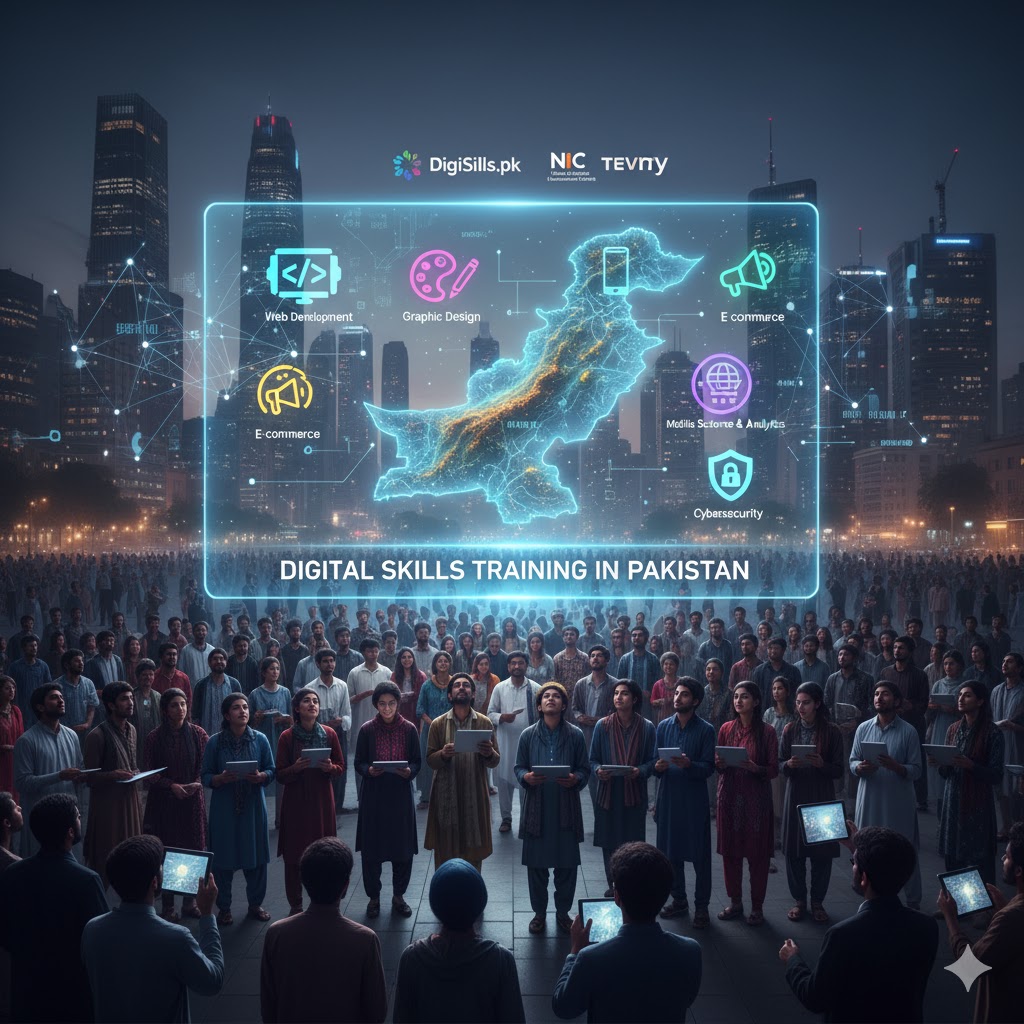
Digital Skills Training in Pakistan
Introduction
Imagine this: as a student in Pakistan, you could learn freelancing, AI, digital marketing, or graphic design—all from your bedroom and do so for free. Sounds too good to be true? It’s not. Over the past few years, Pakistan has quietly exploded in digital skills training, with vast programs aimed at equipping students for a global, freelance-enabled economy. Whether you're in Karachi, Abbottabad, or anywhere in between, the online world offers a real pathway to learning high-demand, future-ready skills.
Why does this matter? Because in a rapidly digitizing world, your ability to learn and apply digital competencies can directly impact your career trajectory. From side gigs to full-time remote work, digital skills are no longer optional they’re essential.
In this article, we’ll explore the leading online digital skills programs in Pakistan, why they’re so powerful, how students can access them, and how to make the most out of them.
Why Digital Skills Matter for Pakistani Students
1. Bridging the Skill Gap in Traditional Education
Pakistan’s formal education system often lags when it comes to equipping students with practical, market-relevant digital skills. As one LinkedIn article points out, many curricula remain outdated, failing to incorporate modern skills like AI, cloud computing, or cybersecurity.
Digital training fills this gap. Rather than just memorizing theory, students can learn real tools and real-world applications, from freelancing and e-commerce to data analysis and content marketing.
2. A Tool for Economic Empowerment
Digital skills unlock tremendous earning potential. With platforms like DigiSkills.pk, many young Pakistanis are earning income online, working for global clients, or building their own ventures.
Moreover, the Pakistani government is investing heavily in digital skill development. For instance, the Khyber Pakhtunkhwa (KP) government has allocated PKR 18 billion for youth digital training in 2025–26.This is not just policy talk digital training is central to national economic goals.
3. Greater Inclusion and Accessibility
Many of these digital training initiatives are free and accessible entirely online. That means students from remote or under-resourced areas can still access top-tier learning. For example, DigiSkills.pk’s courses are designed for a Pakistani audience, using a blend of Urdu and English to ensure accessibility.
Programs like the KPITB (Khyber Pakhtunkhwa Information Technology Board) internships further emphasize inclusion. Their “Women Civic Digital Internship” trains women in web development, data science, and UI/UX.
Top Online Digital Skills Training Programs in Pakistan
Here are some of the most prominent, credible, and student‑friendly digital skills training programs available online in Pakistan:
DigiSkills.pk
What It Is:
DigiSkills.pk is Pakistan’s flagship national training program, sponsored by the government (Ministry of IT & Telecom via Ignite) and run in partnership with the Virtual University of Pakistan.
Courses Offered:
They offer more than 15 courses, including:
-
Freelancing
-
Digital Marketing
-
Graphic Design
-
Video Editing, Animation & Vlogging
-
Data Analytics & Business Intelligence
-
SEO
-
E‑Commerce Management
-
WordPress
-
AutoCAD
-
Creative Writing
-
QuickBooks
-
Virtual Assistant
-
Communication & Soft Skills
Scale & Impact:
-
Over 4.5 million trainings delivered since 2018.
-
In its Phase 3.0, DigiSkills plans to train 3 million more individuals over 3.5 years.
-
E‑certificates are issued through Virtual University.
Success Stories:
Some DigiSkills alumni have earned hundreds of thousands of USD through freelance platforms. For example, Syed Muhammad Bilal reportedly earned USD 520,693 after completing freelancing courses.
KPITB Digital Skills Program
What It Is:
The Khyber Pakhtunkhwa Information Technology Board (KPITB) runs digital upskilling initiatives with a strong regional focus.
Notable Initiatives:
-
Women Civic Digital Internship Program: Trains women in web development, data science, app development, QA, and graphic design.
-
Employable Digital Skills for Youth: Trains youth in newly merged areas of KP in digital skills.
-
Udacity Scholarship Program: In partnership with Udacity, KPITB offers “Nanodegree” programs for example, in data science, cybersecurity, cloud computing — with industry-relevant content from big tech companies like Google and Microsoft.
Outcomes:
In past internships, around 40% of women trainees secured employment, with an average monthly salary around PKR 36,250.
E‑Rozgaar Program (Punjab)
What It Is:
e‑Rozgaar is a project run by the Government of Punjab via the Punjab Information Technology Board (PITB).
Courses Offered:
-
Programming / Tech
-
Content Marketing & Advertising
-
Creative Designing
-
E‑Commerce
-
Mobile App Development
-
UI/UX Design
-
Digital & Social Media Marketing
-
Freelancing (integrated in all tracks)
Why It Matters:
This program aims to train young graduates to freelance or start online work aligning with global outsourcing and gig-economy demands.
NGO and Private Initiatives
Tasdeeq – Digital Literacy Training:
Tasdeeq runs a digital literacy program focused especially on marginalized groups, including blue-collar workers and women.
-
Their curriculum addresses access gaps: only about 34% of Pakistani adults have basic digital literacy.
-
The program uses an app, online modules, and offline support to maximize reach.
Digital Education Program by DBA Pakistan:
The Digital Business Association (DBA) of Pakistan runs an education initiative that brings online tech curriculum — from digital literacy to advanced skill training — into underserved communities.
Challenges and Pitfalls to Be Aware Of
While opportunities are booming, there are real risks and limitations. Understanding these helps students make smarter decisions.
1. Digital Divide & Infrastructure
Not all students have reliable internet access or devices. Rural and remote areas in Pakistan often face lower broadband penetration, which can limit engagement in online programs.
2. Scams & Quality Concerns
There have been reports though mostly anecdotal of digital training being mismanaged. On Reddit, some users allege that a UNDP-backed training in Sindh was outsourced to underqualified trainers.
These stories underscore the importance of choosing trusted programs, checking credentials, and verifying trainer backgrounds.
3. Sustainment and Motivation
Free courses are a double-edged sword: they lower the barrier, but with no financial investment, dropout rates can be high. As DigiSkills itself notes, self-discipline and time management are essential.
4. Curriculum Relevance
Not all programs update rapidly. Some traditional institutions still offer content that lags behind emerging technologies (AI, blockchain, etc.). It’s critical to choose courses aligned with global market demand.
How Students Can Get the Most Out of Online Digital Skills Training
Here are actionable tips to maximize your learning and benefit:
-
Define Your Goal Early
-
Do you want to freelance, build a startup, or find a remote job?
-
Choose courses accordingly: e.g., freelancing + digital marketing for income; UI/UX or AI for startup or career.
-
-
Pick Reputable Platforms
-
Prefer government-backed programs like DigiSkills (Ignite + Virtual University)
-
For paid or scholarship programs, verify partners (e.g., Udacity, Google, Microsoft via KPITB)
-
-
Develop a Learning Schedule
-
Set consistent hours each week.
-
Use time‑management techniques like Pomodoro or scheduled blocks.
-
Engage with peer study groups; accountability increases completion.
-
-
Apply While You Learn
-
Do hands-on projects (build a small website, run a mock social media campaign, etc.).
-
Use real clients (even classmates or local small businesses) to build a portfolio.
-
-
Leverage Certificates
-
Digital training providers often give e-certificates (e.g., DigiSkills). Use them on LinkedIn, portfolios, and job applications.
-
Some programs’ certs carry weight in freelance marketplaces.
-
-
Network and Seek Mentorship
-
Join online communities: WhatsApp, Discord, or LinkedIn groups of DigiSkills alumni or tech interns.
-
Seek mentorship from industry professionals via internships or volunteer projects.
-
-
Build a Freelance Mindset
-
Treat training like a mini‑business: think of every client, project, interaction as a business exercise.
-
Learn about pricing, contracts, negotiation, and deliverables early on.
-
Real‑World Impact: Success Stories & Evidence
-
DigiSkills Alumni: Several students who completed DigiSkills courses have become top-rated freelancers, earning hundreds of thousands of USD through platforms like Fiverr.
-
KPITB Internship Graduates: About 40% of women who completed the internship program secured paid work, illustrating the practical career impact.
-
Government Commitment: With KP allocating PKR 18 billion to digital skill development, it's clear that equipping youth with high-value skills is considered a cornerstone of Pakistan’s future economic plans.
Why This Topic Is Especially Critical in 2025–2026
-
Fourth Industrial Revolution: As AI, automation, and remote work reshape work globally, Pakistan’s youth need to invest in digital literacy and specialized skills.
-
Gig Economy Boom: Freelancing continues to be one of the fastest-growing employment channels for Pakistani youth, offering flexibility and global reach.
-
Policy Alignment: National and provincial governments are doubling down on digital skills through big-budget programs, showing long-term commitment.
-
Inclusive Growth: Online training offers a level playing field, potentially closing gender, rural-urban, and economic gaps.
Conclusion
For students in Pakistan, online digital skills training isn’t just a learning opportunity it’s a game-changer. From DigiSkills’ free government‑backed courses to KPITB’s tech internships, the landscape is rich with pathways to acquire meaningful, market-ready skills.
But opportunity alone isn’t enough. To truly benefit:
-
Choose trusted platforms
-
Set clear goals
-
Build autonomous habits
-
Apply your learning from day one
-
Network like a pro
If you invest your time wisely now, you won’t just learn you’ll build a foundation for future work, income, and even your own digital venture. The world of work is changing fast. With digital skills, you’re not just keeping up you’re staying ahead.
FAQs
Q: Is DigiSkills training really free for students?
A: Yes Courses on DigiSkills.pk are offered free of cost, funded by the Government of Pakistan through Ignite and executed via Virtual University.
Q: Do I need a fast internet connection and a high‑end laptop to benefit from these courses?
A: While a stable internet connection is helpful, many courses are optimized for standard devices. However, infrastructure remains a challenge in some areas, so you may need to plan according to your situation.
Q: Will completing these courses guarantee me a job
A: Not automatically but many students have used DigiSkills and KPITB programs to launch freelance careers, internships, or full-time remote roles. Applying your skills through projects and building a portfolio is key.
Q: Are there any risks or scams I should watch out for?
A: Yes. Some online programs have reported issues related to quality and transparency. Always verify the provider’s credentials (especially partners and funding) before enrolling. As one Redditor warns, some programs promised by international organizations were mismanaged.
Q: How do I choose which digital skill to learn first?
A: Start by assessing your goals:
-
Want to earn quickly online? → Freelancing, Digital Marketing, Graphic Design.
-
Want a career in tech? → Data Analytics, AI, Software Development.
-
Want to build your own digital business? → E-commerce, UI/UX, App Development.
Tags :
No Tags











0 Comments